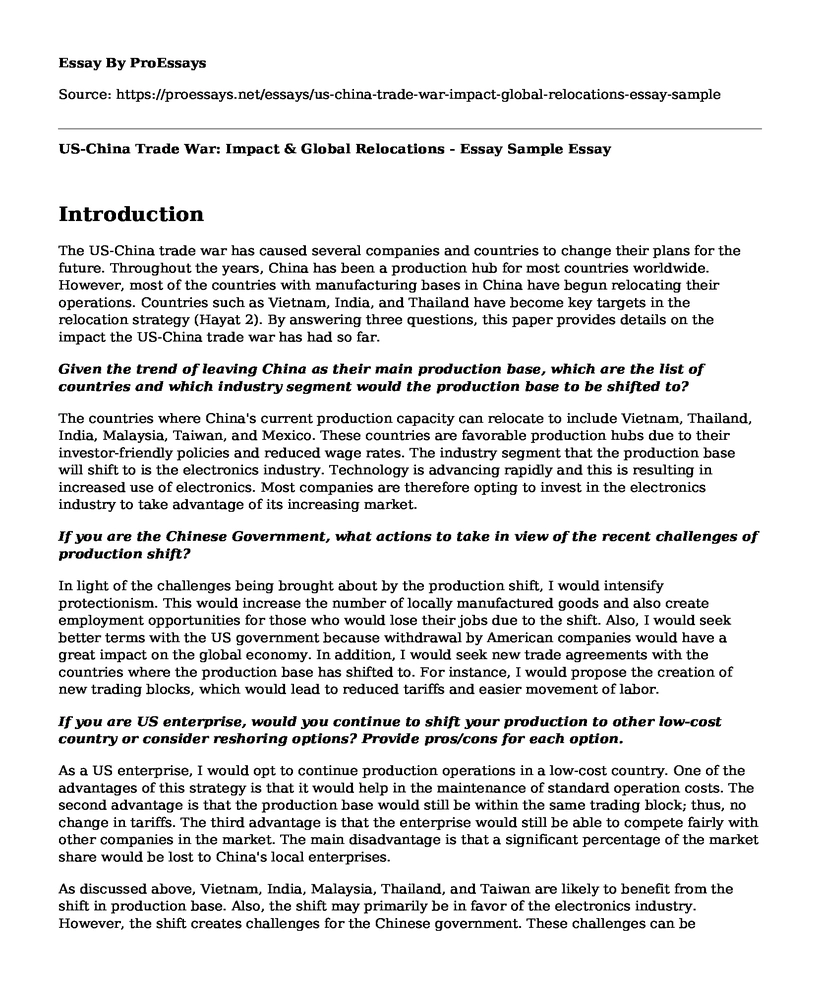Introduction
The US-China trade war has caused several companies and countries to change their plans for the future. Throughout the years, China has been a production hub for most countries worldwide. However, most of the countries with manufacturing bases in China have begun relocating their operations. Countries such as Vietnam, India, and Thailand have become key targets in the relocation strategy (Hayat 2). By answering three questions, this paper provides details on the impact the US-China trade war has had so far.
Given the trend of leaving China as their main production base, which are the list of countries and which industry segment would the production base to be shifted to?
The countries where China's current production capacity can relocate to include Vietnam, Thailand, India, Malaysia, Taiwan, and Mexico. These countries are favorable production hubs due to their investor-friendly policies and reduced wage rates. The industry segment that the production base will shift to is the electronics industry. Technology is advancing rapidly and this is resulting in increased use of electronics. Most companies are therefore opting to invest in the electronics industry to take advantage of its increasing market.
If you are the Chinese Government, what actions to take in view of the recent challenges of production shift?
In light of the challenges being brought about by the production shift, I would intensify protectionism. This would increase the number of locally manufactured goods and also create employment opportunities for those who would lose their jobs due to the shift. Also, I would seek better terms with the US government because withdrawal by American companies would have a great impact on the global economy. In addition, I would seek new trade agreements with the countries where the production base has shifted to. For instance, I would propose the creation of new trading blocks, which would lead to reduced tariffs and easier movement of labor.
If you are US enterprise, would you continue to shift your production to other low-cost country or consider reshoring options? Provide pros/cons for each option.
As a US enterprise, I would opt to continue production operations in a low-cost country. One of the advantages of this strategy is that it would help in the maintenance of standard operation costs. The second advantage is that the production base would still be within the same trading block; thus, no change in tariffs. The third advantage is that the enterprise would still be able to compete fairly with other companies in the market. The main disadvantage is that a significant percentage of the market share would be lost to China's local enterprises.
As discussed above, Vietnam, India, Malaysia, Thailand, and Taiwan are likely to benefit from the shift in production base. Also, the shift may primarily be in favor of the electronics industry. However, the shift creates challenges for the Chinese government. These challenges can be overcome with spirited actions such as protectionism. For US enterprises, the better option is maintaining operations in low-cost countries to remain relevant and profitable.
Works Cited
Hayat, Raphie. Leaving China: Which Countries Might Benefit from a Relocation of Production? 2019, www.economics.rabobank.com/publications/2019/august/leaving-china-countries-might-benefit-from-relocation-production/. Accessed 18 Feb. 2020.
Cite this page
US-China Trade War: Impact & Global Relocations - Essay Sample. (2023, Apr 08). Retrieved from https://proessays.net/essays/us-china-trade-war-impact-global-relocations-essay-sample
If you are the original author of this essay and no longer wish to have it published on the ProEssays website, please click below to request its removal:
- Paper Example on Federalism and Antifederalism
- Kingdon's Model of Policymaking Essay Example
- Economics and International Trade in Australia Paper Example
- Political Parties in the Caribbean Essay Example
- Essay Sample on Canada and Germany Food Trade
- Regulatory Impact Assessment: Improving Regulatory Quality Worldwide - Essay Sample
- Conflict Between US Govt & Military: Problems Since Rev War - Essay Sample







